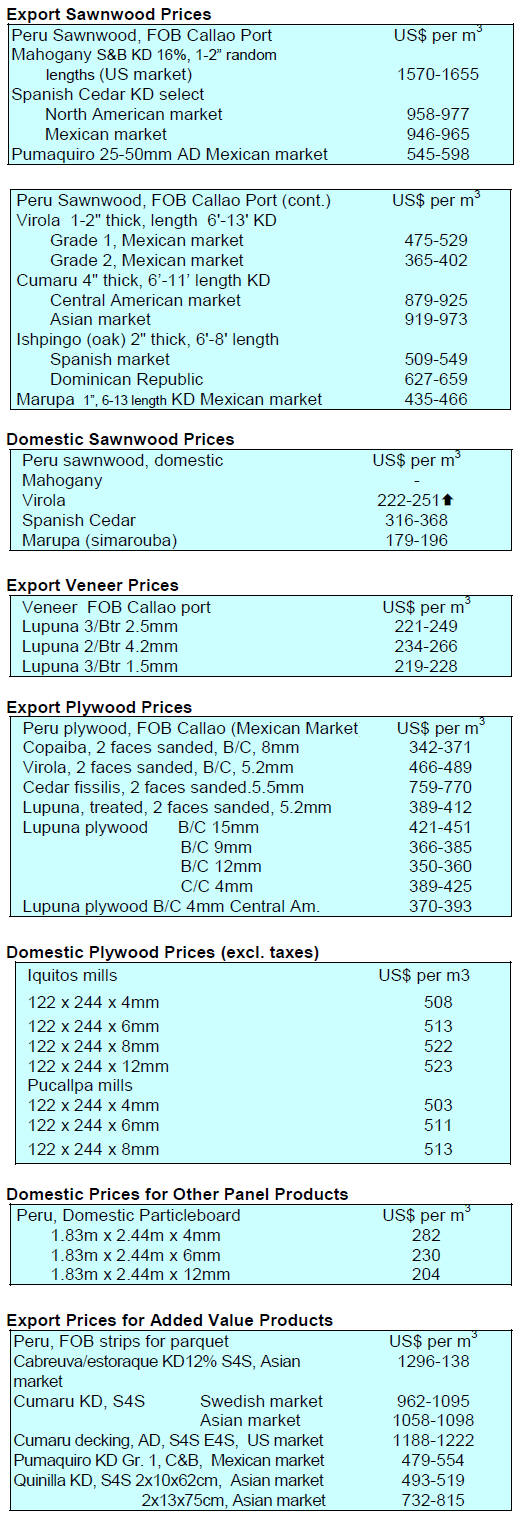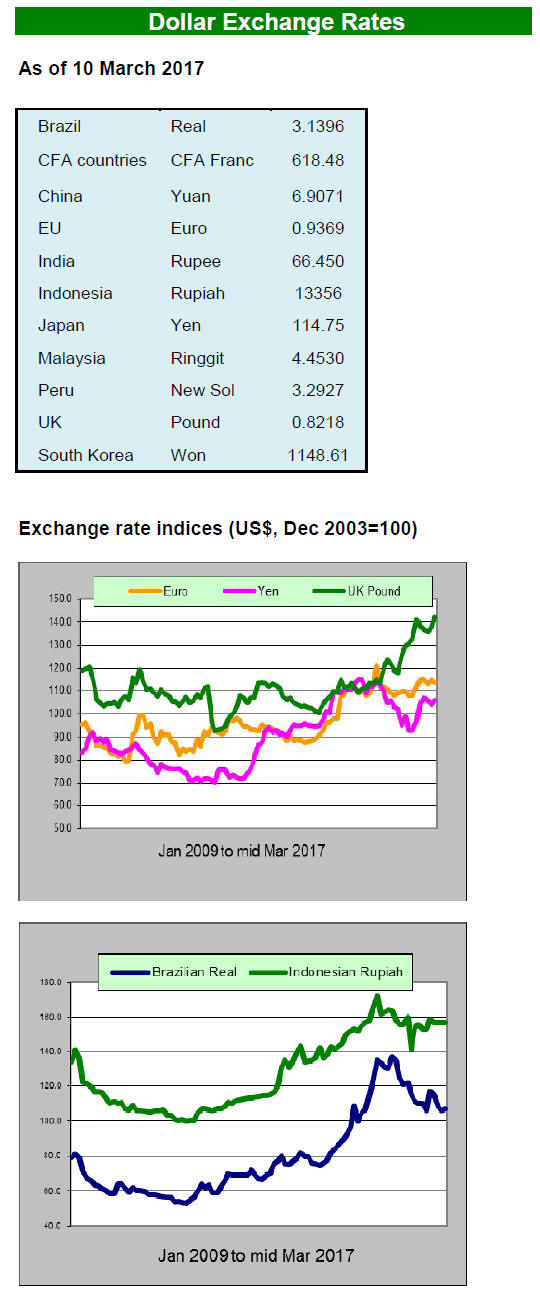2. GHANA
Rosewood export banned
The Minister of Lands and Natural Resources has
announced a nationwide ban on the export of rosewood
products and instructed the Forestry Commission to stop
issuing felling permits for rosewood.
The Minister announced a renewed drive against rosewood
felling when he met stakeholders called to support solving
the challenges in the forestry and timber sectors which he
said have a huge potential for driving economic
development in the country.
Natural resource sector receive boost in budget
The new administration has pledged resources to support
the forestry and this has been reflected in the 2017 budget
dubbed ‘Sowing the Seeds for Growth and Jobs’.
Finance Minister Ken Ofori-Atta said the budget aims to
address issues hindering growth in the manufacturing
sector and in job creation by the private sector.
The 2017 budget includes some key initiatives to boost the
forestry sector:
 the Ministry of Lands and Natural
Resources has
the Ministry of Lands and Natural
Resources has
been allocated a budget of GHó348 million for
2017, an 18% increase on last year’s budget
 work will be undertaken to expand the
work of
work will be undertaken to expand the
work of
the Forestry Commission ‘Rapid Response Unit’
whose task is to protect forest reserves
 and the private sector will be engaged
in
and the private sector will be engaged
in
establishing 6,000ha of plantations through
public/private partnerships
The key macroeconomic targets in the budget for the
medium-term (2017-2019) include an overall real GDP
growth to an average of 7.4% and inflation within the
range of 8-10%.
In related news, the Forestry Commission has appealed to
the government to allow officers in the Rapid Response
Unit to be provided with firearms training so they can
effectively confront poachers and illegal miners in national
forests. Currently the Unit does not have weapons to
match the sophisticated assault rifles used by illegal
chainsaw operators and miners.
Affordable housing plan
At over 30% Ghana has one of the highest mortgage
interest rates in the world which puts owning a home out
of reach of most people. Atta Akyea, the Minister for
Housing and Works, has proposed setting up a fund for
affordable homes and the abolition of the tax on property
sales.
In a recent report Oxfordeconomics says “Ghana currently
faces a significant housing shortage, with various industry
estimates putting the deficit at roughly 1.7 mil. units and
growing at a rate of 70,000 units a year”.
Meeting the demand for housing will require vast amounts
of wood products so if the plan is implemented the wood
product manufacturing sector would get a considerable
boost to domestic sales.
See: http://www.oxfordbusinessgroup.com/searchresults?
sector=all&country=54035&keywords=

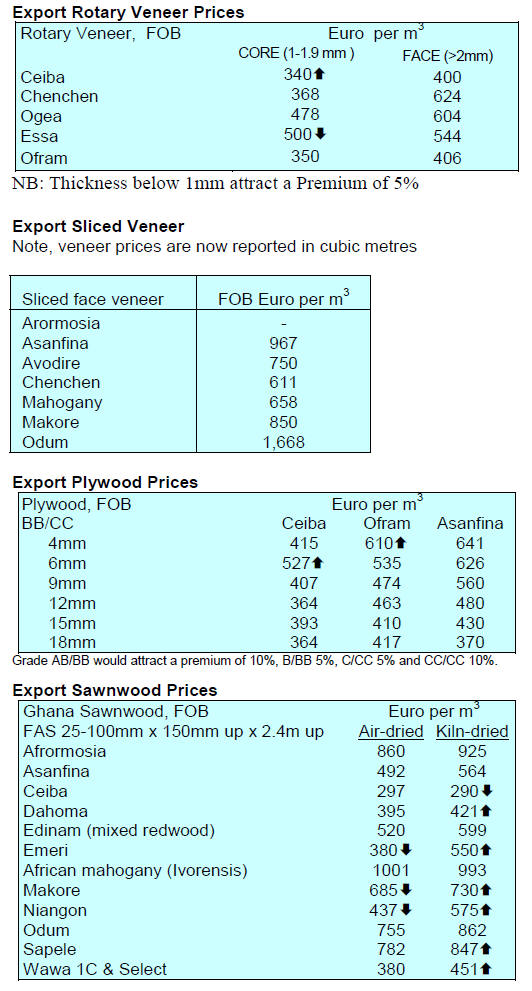
3.
SOUTH AFRICA
Rising mill stocks signal weak demand
Local analysts report the timber market is currently
subdued and that this is borne out by the high level of
stocks at domestic sawmills.
It is reported that delivery times from domestic mills have
come down from around 6 weeks during the time of peak
demand to just 2 days now in some cases. Last year pine
mills in South Africa sold just over 63,000 cu.m less than
in 2015.
Local mills had been hoping to increase prices in the first
quarter to compensate for rising production costs but
attempts at a price increase have now been postponed until
at least May.
The weak market is mainly the result of the stagnant
housing and construction market.
Sales of domestic constructional timbers are down
as are
sales of meranti and okoume.
Hardwood sales have fallen so much that there has been
some moderate discounting as importers try to adjust their
stocks. Demand for US hardwoods is similarly affected
and it is only exchange rates that are impacting price
levels.
Domestic MDF and particleboard producers pushed
through a small price increase recently and this is being
maintained even as demand slips. The main reason behind
the steady prices for panels is the weaker rand which has
pushed up the price of imported panels.
Shopfitting boom coming to an end
There is still some ongoing activity in the shopfitting
segment of the market but many of the shopping mall
construction projects are nearing completion. There are
few prospects for new projects so suppliers to the
shopfitting segment of the market will have to rely on
refurbishments and shop upgrades to maintain business.
The industry is still anxiously awaiting the announcement
of government construction contracts which has been
further delayed creating stress in the timber sector.
GDP dips into negative in fourth quarter 2016
A recent press release from Stats South Africa has
reported the main contributors to the negative GDP growth
rate late last year were the mining/quarrying and
manufacturing sectors. Mining and quarrying activity
declined 11.5% year on year in the fourth quarter, largely
the result of lower production in coal, gold and other ores.
Output from the manufacturing sector dropped 3%
because of lower production in the food and beverages,
petroleum, chemical products, rubber and plastic sectors.
The agriculture, forestry and fishing industry have been in
decline for eight consecutive quarters.
The largest positive contributors to GDP were the trade,
catering, the accommodation industry, finance, real estate
and business services.
See:
http://www.statssa.gov.za/?p=9631
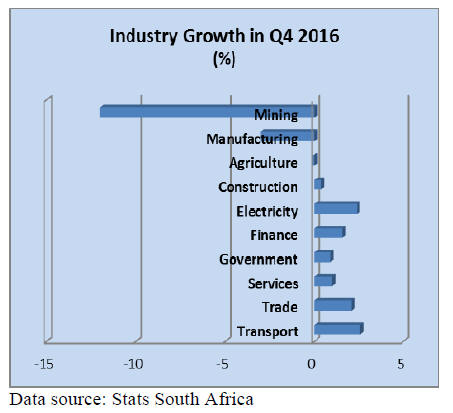
4.
MALAYSIA
Furniture fair month in Malaysia
The four-day Malaysian International Furniture Fair
(MIFF) and the Export Furniture Exhibition (EFE) were
held simultaneously running 8-11 March. While report on
the fairs are yet to be released, MIFF chairman, Tan Chin
Huat, said his show is expected to generate contracts
worth in the region of US$1bil. Last year contracts
concluded topped US$900 mil.
Tan said he expects the weaker Ringgit to help boost
exports and reports that this year’s MIFF hosted a record
number of exhibitors.
The Export Furniture Exhibition (EFE) was arranged by
EFE Expo Sdn Bhd, a wholly-owned subsidiary of the
Malaysian Furniture Council (MFC). This four-day event
showcased a diverse range of furniture featuring more than
300 exhibitors across eight halls within a 30,000sq.m
exhibition space at Putra World Trade Centre in Kuala
Lumpur.
Speaking on these two events, Plantation Industries and
Commodities Minister, Mah Siew Keong, said increasing
demand for Malaysian furniture products, coupled with
innovation in the industry, will ensure growth of the
Malaysian furniture industry.
2017 has been declared the Year of the Internet Economy
by the Malaysian Government and Minister Mah
expressed confidence that local furniture producers would
expand activities in the digital marketplace.
MTC sponsorship of buyers to Malaysian Fairs
In a recent press release the Malaysian Timber Council
(MTC) has explained the philosophy behind its sponsoring
of exhibition space and visits to these trade fairs which
aim to attract investment and facilitate trade for Malaysian
timber and wood product manufacturers.
This year MTC sponsored participation of some SME
furniture companies at both fairs. At the same time, the
Council also sponsored 15 Indian companies for the India
Export Pavilion in EFE.
Last year MTC sponsored 20 buyers from India but has
trebled the number this year. “Sponsoring these buyers is
part of MTC’s Incoming Sourcing Mission and it has
delivered far-reaching benefits to the industry which is
why we are tripling the number of sponsorships for this
year,” said MTC Chief Executive Officer Datuk Dr Abdul
Rahim Nik.
For more see:
http://www.mtc.com.my/images/media/392/20170307_mtc_trebl
es_sponsorship_of_buyers_to_furniture_fairs.pdf
Local species for plantations
Sarawak’s Chief Minister, Abang Johari Tun Openg,
wants to explore the opportunities for establishing
plantations of fast-growing indigenous trees to supply
wood for the timber industry.
Currently, most of the plantations are of acacia
mangium.
The Chief Minister called for research to identify local
species suitable for plantations.
In related news a South Korea company has expressed
interest in investing in the biomass industry in Sarawak. A
spokesperson from the Embassy of the Republic of Korea,
said the potential of biomass industry in Malaysia is very
attractive for Korean companies.
Plywood export prices
Plywood traders in Sarawak reported February FOB
export prices as:
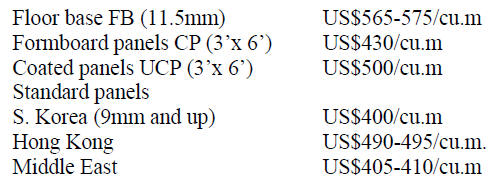
5. INDONESIA
Plans to expand non-tax revenues from
forestry
The Ministry of Environment and Forestry plans to
reactivate Standing Stock Compensation charges to boost
non-tax revenue from production forests. Putera Parthama,
Director General in the Ministry said 2016 non-tax
revenues from the forestry sector were Rp2.7 trillion
sharply down on the level in 2015.
Parthama suggested that one of the causes of falling nontax
revenues was the gradual decline in output from
forestry enterprises much of which stems from the falling
prices for Roundwood, especially from plantations.
Forestry enterprises have role in climate change
mitigation
The Director General of Climate Change in the Ministry of
Environment and Forestry said enterprises can play an
important role in the national emission reduction target of
29% by 2030.
In the discussion on ratification of the Paris Agreement on
Climate Change it was argued that support from forestry
businesses, along with local governments, nongovernmental
organisations and indigenous peoples is
essential if emission reduction targets are to be achieved.
In the national emission reduction plan the forestry sector
is expected to contribute around 17% of the reductions.
Other main contributing sectors are energy, waste
management and agriculture.
Indonesia, Saudi Arabia seek expanded trade
cooperation
Indonesia and Saudi Arabia have agreed to strengthen
collaboration in developing mutually beneficial trade
strategies, market research and the encouragement of joint
activities.
Indonesia’s Trade Minister reported that the two
countries
will share trade databases to encourage business
cooperation.
It was noted that Saudi Arabia is tied into the Gulf
Cooperation Council Customs Union and any trade deals
must be conducted through this Union.
In related news, the chairman of the Indonesian Chamber
of Commerce and Industry (Kadin), has reported that
Saudi Arabian entrepreneurs were attracted by Indonesia’s
woodcraft products and that there are opportunities to
expand trade with Saudi Arabia.
In recent years Indonesia’s trade with Saudi Arabia has
been declining, dropping to US$5 billion in 2016
compared to US$8 billion in 2015.
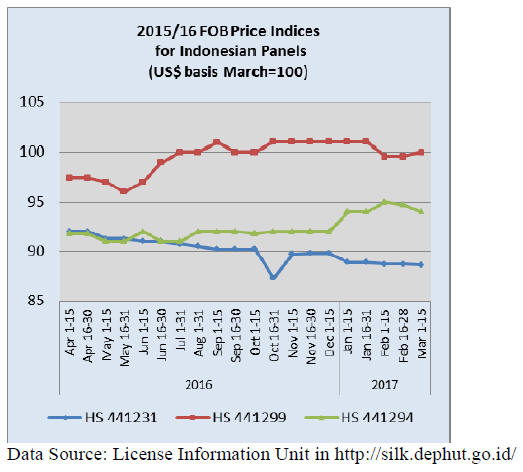
6. MYANMAR
Exporters rush to avoid 1 April tax
Parliament has now confirmed the 10% Special
Commodity Tax on all sawn timber export and local sales.
This tax and the zero tax on finished products will come
into force 1 April this year. It is understood that the private
sector and Forestry Department are now discussing what
products are included in the term sawn timber.
A domestic newspaper, Yangon Times Journal, quoted a
former Secretary of a timber association as contending that
teak is itself a high value product so all teak products
could be deemed high value. He pointed out that the price
per cubic metre for high quality sawnwood can be much
higher than the per cubic metre price of wood in, for
example, a teak garden chair.
As a result of the introduction of the Special Commodity
Tax on sawnwood manufacturers are rushing to ship
stocks of teak during March and this is putting pressure on
the availability of containers.
One major exporter has said that his company has
accepted the new tax as a contribution to government
revenues but hopes that the authorities will be flexible in
how the ruling is applied.
It is reported that both state and private sector mills are
facing difficulty in securing workers and they are also
having problems with log supplies. These two issues and
the imposition of the new tax have prompted some foreign
owned mills to consider ceasing production.
Interim export data
For the 9 months April to December 2016 earnings from
timber exports totalled around US$75 million. As of
December last year there were around 100 wood product
exporters in Myanmar. There is a growing concern on the
part of EU importers about verification of the legality of
wood products from Myanmar.
EU traders who attended the Myanmar Timber Legality
Assessment System workshop last month in Yangon
expressed satisfaction on the Gap Assessment Report by
Myanmar Forest Certification Committee. They expressed
optimism on prospects for increased transparency by the
Forestry Department and the Myanma Timber Enterprise
which will provide tangible information on the traceability
and the legality status of Myanmar wood products.
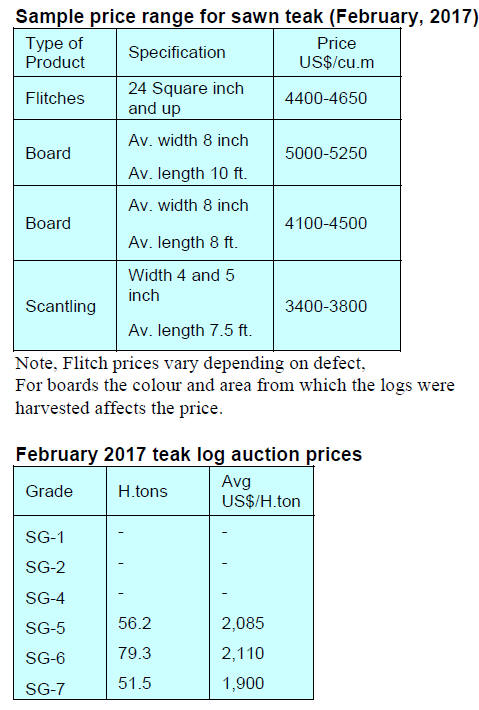
7. INDIA
Inflation rate trends
The Office of the Economic Adviser (OEA) to the Indian
government provides trends in the Wholesale Price Index
(WPI). The official Wholesale Price Index for all
commodities (Base: 2004-05=100) for the month of
January, 2017 rose by 1% to 184.6 from 182.8 for the
previous month.
The annual year on year rate of inflation, based on the
monthly WPI, stood at 5.25% (provisional) for January
2017.
See:
http://eaindustry.nic.in/cmonthly.pdf
Timber and plywood price indices slide at year end
The OEA also reports Wholesale Price Indices for a
variety of wood products. The Wholesale Price Indices for
Wood products and Plywood are shown below.
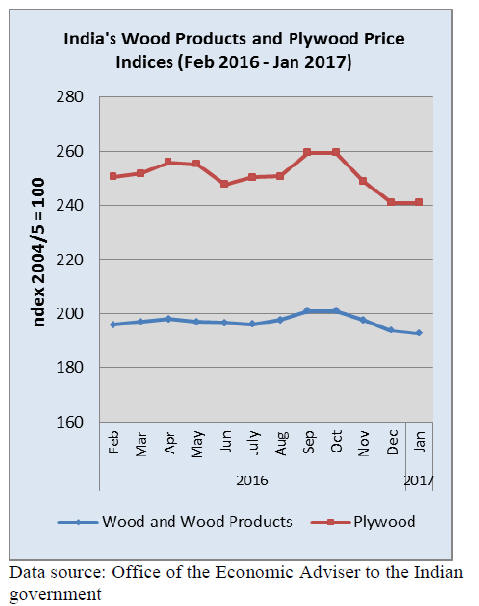
Demonetisation continues to haunt
Provisional figures from India’s Central Statistics Office
(CSO) suggest GDP for the third quarter 2016 expanded
7% compared with 7.3% in the previous quarter as the
effects of demonetisation ran through the economy.
Viral Acharya, Deputy Governor of the Reserve Bank of
India, has said the Bank expects the negative impact of the
withdrawal of large denomination currency notes will
continue to be felt into early 2017.
The 7% growth figure has been challenged by some local
analysts who say the full impact of the demonetization was
not factored in when the CSO prepared growth estimates.
More help for affordable homes sector
Of the estimated 400 million people living in urban India,
some 35% live in ‘informal’ housing. These temporary
housing areas lack basic services and most of households
do not have any formal property rights and depend on
casual informal work making it difficult for them to break
out of the poverty trap.
The government has ambitious plans to expand affordable
housing and this will get a boost as affordable houses may
soon be exempt from stamp duty, which currently ranges
from between 4% and 8% of the transaction value.
At a recent meeting with CREDAI, the Confederation of
Real Estate Developers' Associations of India, the Minister
for Urban Development reported that his ministry had
submitted a request to state governments to exempt
affordable houses from stamp duty.
He also reported that the central government would ensure
that there was no net tax increase on housing as the new
goods and services tax (GST) is implemented.
Teak auctions in Western India
Auctions at various forest depots in North and South
Dangs and the Valsad Divisions were held from 16
January to 8 February 2017. Approximately 13,000 cubic
metres of logs were offered for sale of which some 65%
was teak, the balance being hardwoods such as Adina
cordifolia, Gmelina arborea, Pterocarpus marsupium,
Acacia catechu and Mitragyna parviflora.
Since imported teak logs are mostly of small girth buyers
attending the auction of domestic logs are there to secure
larger girth logs. At the recent sale prices were down
slightly from the most recent past sale.
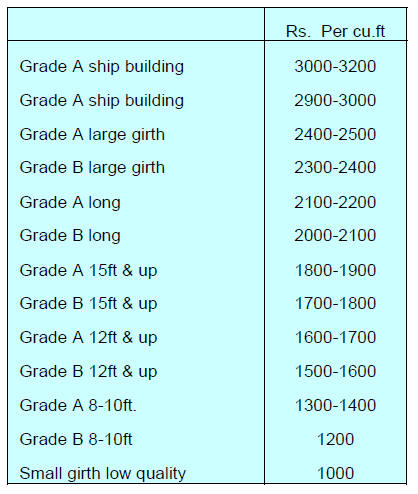
Very good quality non-teak hardwood logs 3-4m long
having girths 91cms & up of haldu (Adina cordifolia),
laurel (Terminalia tomentosa), kalam (Mitragyna
parviflora) and Pterocarpus marsupium attracted prices in
the range of Rs.1200-1300 per cu.ft., grade A logs were
sold at RS. 1000-1100 per cu.ft and medium quality logs
were sold at between Rs500-650. Small girth logs were
sold at Rs.300-500 per cu.ft.
Analysts at the sale say the main reason for the slip in
prices was sluggish market conditions for teak in the local
and international markets and the fact that the logs offered
had high reserve prices but were smaller than at the
previous sale.
Buyers anticipate that as fresh logs arrive at the depot
there will be a downward pressure on reserve prices for
the unsold ‘old’ logs.

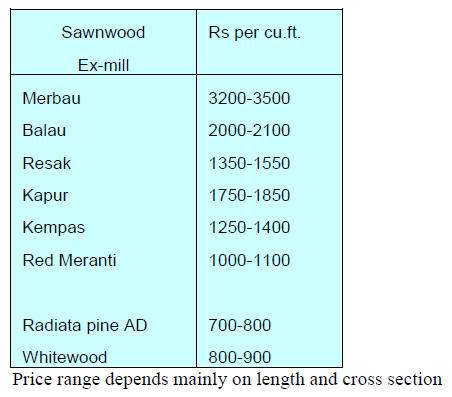
Myanmar teak prices
Growing competition from alternative durable timbers at
much lower prices is affecting demand in the Indian
domestic market for Myanmar teak. The decision by
Myanmar to impose an export tax on sawnwood will
increase the landing cost and further undermine sales in
the local market.
At the moment prices have not changed but this will not
last for long as imports continue but at higher prices.
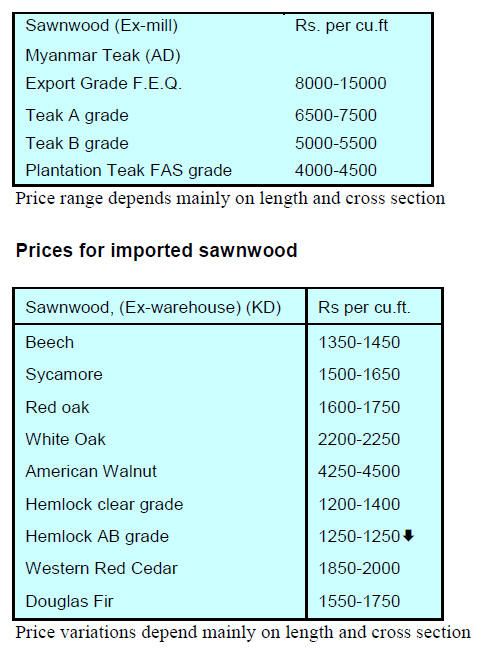
Pressure mounts for increase in plywood prices
Plywood prices remain unchanged from two weeks earlier
but as production costs rise due to higher resin and log
prices then manufacturers will be looking for an
opportunity to lift prices by around 5 to 6%.
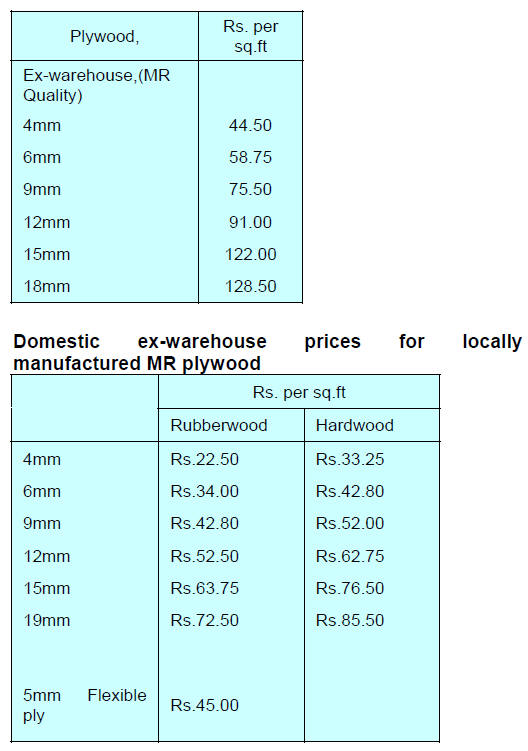
8. BRAZIL
Furniture industries react strongly to
plywood price
hike
The Furniture Industry Association of Rio Grande do Sul
(Movergs) and the Bento Gonšalves Furniture Industry
Union (Sindmˇveis) jointly issued a statement denying
support for the recent plywood price increases announced
by manufacturers.
The furniture industry union said that the increase would
add between 8-15% to the price of plywood used for
furniture manufacturing. Movergs and Sindmˇveis cannot
understand how plywood makers could contemplate an
increase with the furniture manufacturing sector facing a
severe downturn in sales.
According to the Brazilian Institute of Geography and
Statistics (IBGE) 2016 overall furniture sector production
across Brazil was down 11% compared to 2015 but in the
Bento Gonšalves furniture cluster sales dropped 18% in
2016 and the industry there had the lowest employment
level for the past 10 years.
New regulation raises risk that production could be
halted merely on suspicion of irregularities
The Center for Timber Producers and Exporters of the
state of Mato Grosso (CIPEM) recently met to discuss the
likely impact of the new regulation IN 01/2017 issued by
the Brazilian Institute for Environment and Renewable
Natural Resources (IBAMA).
This regulation sets out new rules on activities in
the
forest-based sector including logging in the Amazon.
During the CIPEM meeting entrepreneurs expressed
concern about the punitive nature of this new regulation as
it imposes even more restriction than the current Federal
Decree, Decree 6514/2008. The risk is, say analysts, that it
will hamper production in the industry.
Under the previous regulation wrongdoing had to be
proven before forest operations could be halted. However,
the private sector interpretation of the new regulation is
that forest operations can be halted merely on suspicion of
irregularities. This, say operators, could give rise to
unnecessary suspensions as the criteria for ‘wrongdoing’
are unclear.
Operators also point out that their experience of the
current regulation is that, in the event an investigation
reveals no wrongdoing, the process for reinstatement is
time-consuming and bureaucratic. CIPEM plans to
promote discussions on this and closely follow
developments if a case is brought against an operator.
Woodbased panel exports surged in January
The Brazilian Tree Industry (IB┴) has reported that
January 2017 exports of woodbased panels increased by
57% to 85,000 cu.m compared to levels in January 2016.
Export earings in January reached US$19 million, a 46%
increase year on year.
Sales in the domestic market also rose in January 2017
with some 508,000 cu.m traded, an almost 8% increase
compared to January 2016.
Exports of woodbased panels grew faster than exports of
pulp and paper. In January 2017, the pulp and paper sector
recorded exports of US$765 million (+ 18.4%). Latin
American countries were the main markets for Brazil’s
woodbased panels and paper.
Northern Mato Grosso to develop timber export cluster
The Timber Industry Union of Northern Mato Grosso
State (SINDUSMAD) is planning to create a timber export
cluster in Sinop, the fourth largest city in northern Mato
Grosso. The Center for Timber Producers and Exporters of
the state of Mato Grosso (CIPEM) and the Federation of
Industries of Mato Grosso State (FIEMT) are supporting
the plan.
Sinop is one the largest timber producer municipalities in
the region and about 10% of the timber companies there
are exporting. There are about 60 companies with export
potential but currently focus only on the domestic market.
The aim is to have more enterprises diversify into export
markets.
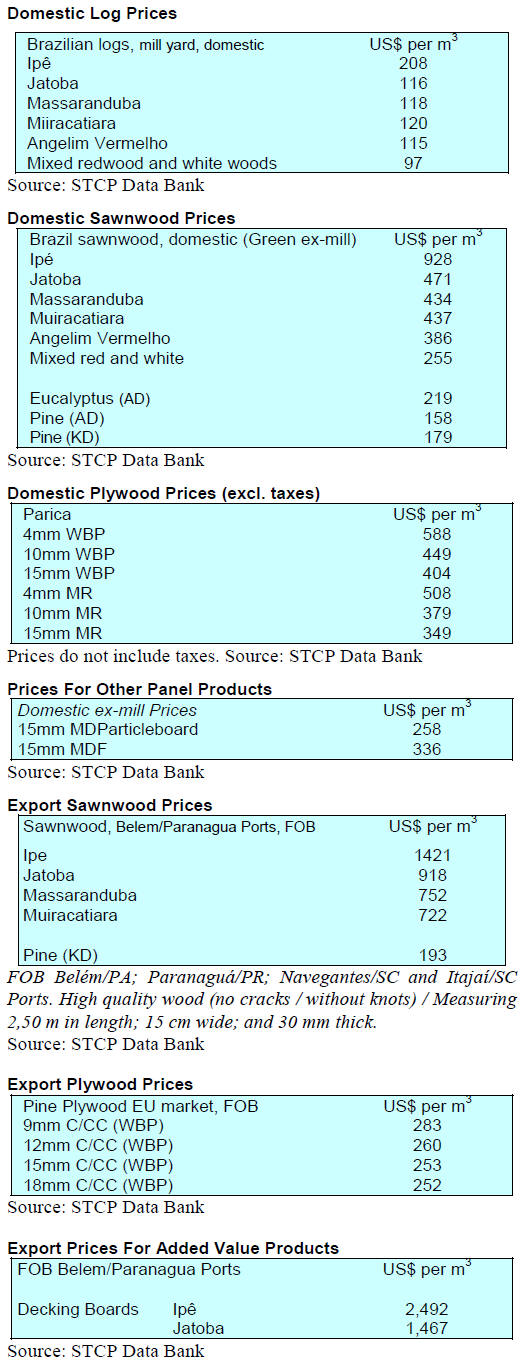
9.
PERU
Wood processing machinery show scheduled
for this
year
This year the sixth biannual wood working machinery fair,
Fenafor Maderera, will be held from 24 to 26 August.
Fenafor has earned international recognition as a leading
event for Latin America and is considered as a good
platform to launch new processes and products for the
timber sector in Peru.
Analysts write, “Fenafor offers the industry in Peru an
opportunity to experience the most diverse range of
machines, equipment, supplies and services for wood
processing”.
In the most recent Fenafor, over half of the exhibitors were
from overseas and included companies from Germany,
Argentina, Brazil, Colombia, Chile, Spain, Italy and the
USA. Peruvian companies specialising in machine
manufacturing and supplies for the timber industry also
participated .
Productivity-oriented innovation and market
diversification key issues for industry
In a statement on its website the Association of Peruvian
Exporters (ADEX) says the projected rapid growth in
2017 exports will result in the creation of some 300,000
direct, indirect jobs. If this is achieved it would represent
an almost 10% rise on the number of jobs created in 2016.
ADEX President, Juan Varilias, called for the
implementation of new strategies to boost shipments of
manufactured goods as increased manufacturing can create
jobs.
A survey of businessmen reported by ADEX showed
productivity-oriented innovation and market
diversification are the key issue for manufacturers in the
country. Eliminating bureaucratic’ red-tape’ and legal
barriers is also high on the wish list for local industries.
See: http://www.andina.com.pe/Ingles/noticia-perus-exportsector-
to-create-310000-jobs-this-year-647960.aspx
Agroforestry buffer zone for protected areas
Plant a million trees in Tambopata and Bahuaja Sonene to
stop deforestation. Around 1 million cocoa trees have been
planted to create a buffer zone around the Tambopata
National Reserve and the Bahuaja Sonene National Park in
Madre de Dios according to SERNAP (El Servicio
Nacional de ┴reas Naturales Protegidas por el Estado).
This initiative aims to eliminate deforestation by creating
agroforestry systems in degraded areas adjacent to
protected areas.
